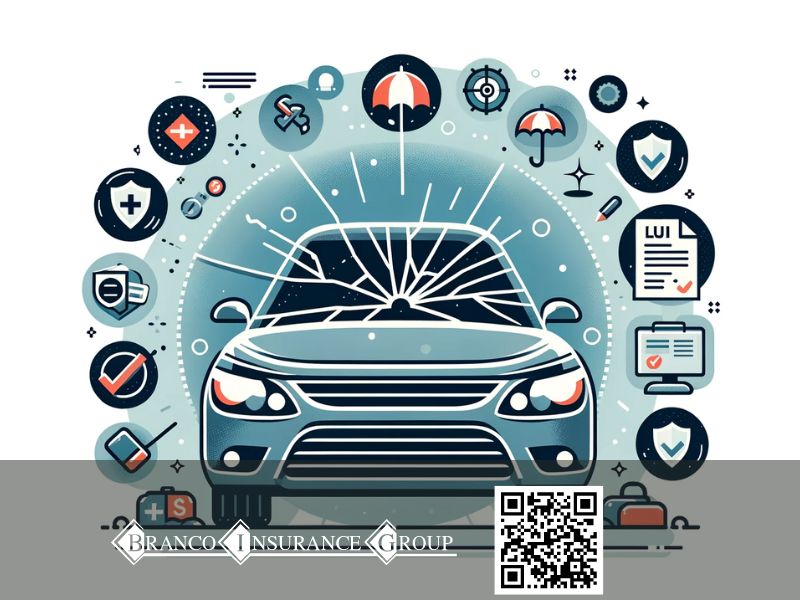
Tips to Prevent Medicare Fraud
Con artists may try to get your Medicare Number or personal information so they can steal your identity and commit Medicare fraud. Medicare fraud results

Driving around with a cracked or damaged windshield can be dangerous. Not only does it obstruct your view of the road, but it compromises the structural integrity of your vehicle in the event of a collision. That’s why having adequate auto glass coverage through your auto insurance policy is so important.
This guide will explain everything you need to know about auto glass insurance coverage – what it is, what it covers, how to file a claim, and tips for getting the right protection. We’ll also overview key terminology, state laws, and provide answers to some frequently asked questions.
Auto glass coverage, sometimes called windshield coverage, refers to insurance that helps pay for windshield and auto glass repair and replacement services. It protects you from having to pay costly windshield replacement or repair bills out-of-pocket.
There are two main types of auto glass coverage:
Without special glass coverage, you’d have to pay all windshield and auto glass repair and replacement costs yourself.
The specifics of what your auto glass coverage protects depend on your policy limits, state laws, and other factors. But in general, comprehensive policies and full glass add-ons cover damage to:
Comprehensive auto policies and full glass riders also often cover glass repairs in addition to replacements. So if you just get a small rock chip or crack, your insurer may pay for resin injections or other repairs so you can avoid replacing the entire windshield.
While every driver needs liability and collision insurance, not everyone needs special auto glass coverage. Here are some factors to consider when deciding if you should add comprehensive or full glass protection:
Evaluate your situation to determine if comprehensive or full glass makes sense for your needs and budget. Agents can help explain specifics for your state.
Comprehensive coverage is an optional addition to your auto policy that covers vehicle damage from non-collision-related events beyond your control. This includes:
And since it protects against things like road debris cracking your windshield, it covers auto glass damage as well.
Comprehensive glass coverage provides a few key benefits:
It’s important to note that you will be responsible for paying your comprehensive deductible when you file a glass claim before your insurance covers the remaining cost.
For example:
You should file a comprehensive claim anytime you suffer auto glass damage from something other than a collision, like:
As long as you have documented proof of the damage, like photos or police reports, your insurer will cover the claim minus your deductible.
While comprehensive coverage extends to auto glass, full glass coverage provides protection a step above. Also referred to as a no deductible glass rider or zero deductible glass coverage, full glass insurance pays your full windshield or auto glass repair/replacement bill.
Here’s how it works:
So, unlike comprehensive policies that require you to pay the deductible, full glass coverage takes care of the entire bill. This gives you ultimate peace of mind in the event of glass harm.
Full glass coverage/riders cost extra per month. But they can save you money over time if you file any glass claims. No deductible windshield coverage ranges from $2 to $10 extra per month depending on your insurer and policy limits.
Full glass coverage isn’t necessarily right for everyone. Assess your personal situation and risk factors. Good candidates for no-deductible glass riders include:
High-risk drivers: If you log lots of highway miles or have a cracked windshield history, the extra coverage can pay for itself quickly.
Expensive vehicles: For high-tech windshields or luxury cars with costly glass, full protection brings added peace of mind.
States without $0 glass deductible laws: If you live in a state that lets insurers charge glass deductibles like $500 or $1,000+, full coverage can majorly benefit you.
Review your driving habits, where you live, and windshield replacement costs to gauge if you’d benefit.
The cost of windshield coverage varies depending quite a bit on factors like:
Nationwide averages for windshield insurance are:
So, full glass add-ons cost very little monthly. Comprehensive rates can vary more widely based on the above criteria though.
Compare quotes from multiple top auto insurers to find the best auto glass coverage options and pricing for your situation. Having choices lets you optimize coverage and cost.
An easy way to secure savings on comprehensive or full glass premiums is by bundling multiple policies with the same provider. Most leading insurers offer bundling discounts, which commonly applies to:
The more policies you group together, the deeper discounts you can earn. So bundling allows you to get adequate windshield protection while optimizing value.
When auto glass sustains damage, you typically have two options – repair it or completely replace it. Assessing the severity of damage is key to choosing the best route forward.
Small rock chips, cracks under 6 inches, and damage away from the driver’s sightline can often be effectively repaired. Benefits include:
Larger cracks over 6 inches, damage within the driver’s critical sightline, or complex shatters typically require total windshield glass replacement. Signs it’s time to replace include:
Replacing just a windshield (without sensors) can cost $250 to $400 on average. Prices range higher for luxury, specialty, and sensor-equipped glass. Know when to repair vs replace to minimize expenses and safety risks.
An important question many drivers have is whether filing an auto glass insurance claim will increase their car insurance rates. The answer is generally no – windshield replacements are unlikely to impact your premium.
Here’s why:
However, exceptions exist in a couple of scenarios:
Overall though, single windshield repairs/replacements shouldn’t drive rate hikes. Discuss specifics with your insurance provider for more clarity.
You absolutely shouldn’t drive with severely cracked or damaged glass due to the safety hazard it poses. But at what point does it become illegal? The answer depends on your state laws.
In general, it’s illegal to operate a vehicle if damage significantly obstructs the driver’s sightlines or view of mirrors/gauges. States like California expressly prohibit driving with damage that “impairs the driver’s clear vision.”
Rules on cracked windshield legality tend to focus on:
Fines for driving with badly cracked glass range from $50 to a few hundred dollars in most states. Rather than risk legal issues or accidents, repair or replace damaged windshields promptly.
It’s easy to downplay minor glass chips and cracks. But even superficial-seeming damage has real consequences:
Don’t take windshield damage lightly. Get comprehensive insurance coverage so you can repair problems right away and drive safely.
Windshields crack and chip more often than you might think. While every situation is unique, a few prevalent causes of glass damage exist. Stay aware of these common culprits:
No matter how damage occurs, having adequate auto glass insurance that aligns with potential risks provides essential protection.
Table 1: Auto Glass Laws by Some States
State | $0 Glass Deductible Mandated? | Inspection Rules | Tint Restrictions |
Florida | Yes | Cracks causing view obstruction fail inspection | None on windshields |
Kentucky | Yes | No statewide inspections | Windshield tint must allow 70% light transmittance |
South Carolina | Yes | No statewide inspections | Certain windshield top tinting allowed |
Texas | No | Cracks over 1.5 inches and wiper interference prompt inspection failure | Windshield tint must have over 75% VLT |
California | No | Cracks “obstructing driver vision” explicitly prohibited while driving | Aftermarket tint must not excessively reduce visibility |
Connecticut | No | Cracks over 3 inches cause inspection failure if in driver sightline | Windshield tint darkness cannot exceed certain visibility thresholds |
Not all windshield replacements cost the same. Several key factors cause pricing variances:
Vehicle make and model – Some vehicles have more complex windshield shapes and features that are costly to replicate. Luxury cars also tend to use higher-grade glass.
Factory vs. aftermarket glass – OEM factory glass is often pricier than basic aftermarket windshield alternatives. Factory matches are important if you have fancy technology.
Sensor recalibration – Vehicles with advanced driver aids like cameras and sensors usually require professional post-replacement recalibration. This alone can exceed $1,000.
Shop location – Urban area repair facilities may charge higher labor rates and fees for materials.
Insurance deductible – If you choose a higher deductible, more out-of-pocket expenditure applies per windshield claim.
Compare options accounting for these influencing variables unique to your situation and car. Cheaper isn’t necessarily better if replacements seem too good to be true.
While all leading insurers cover vehicle windshield damage under comprehensive policies, some crucial intricacies exist between providers:
Geico – Offers comprehensive protection with typical deductibles. Policyholders can use any licensed glass repair shop without referrals.
Progressive – Comprehensive plans available. $0 glass deductible riders are offered in select states. Approved glass shop networks utilized to control claim costs which policyholders must use.
State Farm – Features standard comprehensive windshield coverage alongside collision insurance. Like Geico, allows customers to independently choose any certified repair facility.
Allstate – Sells comprehensive with competitive glass protection. Allstate auto glass coverage includes complimentary roadside assistance which can help after glass damage makes vehicles undrivable.
When comparing auto policies, clarify details around glass repairs/replacements. Insurer approaches impact policyholder choice freedom and out-of-pocket claim expenses.
Connecticut laws and requirements surrounding windshield replacement insurance differ somewhat from other states. As a Connecticut driver, key things to know include:
Comprehensive protection is essential – Connecticut mandates policyholders carry comprehensive coverage alongside collision insurance on vehicles financed through loans/leases. So most CT drivers already have baseline glass coverage.
Insurers allow glass deductibles – Unlike FL, KY, and SC, Connecticut doesn’t prohibit insurers from charging auto glass deductibles with comprehensive protection. Expect fees with repairs/replacements.
Damage must be safety-impacting for claims – CT restricts using comprehensive insurance for glass damage unless it meaningfully impairs visibility, vehicle control, or ability to pass safety inspections. Purely cosmetic issues aren’t covered.
State safety inspections check glass – Cracks over 3 inches long in driver sightline areas prompt inspection failure. So properly fix these promptly.
Tints cannot excessively reduce light transmittance – Window tint darkness laws apply to windshields too – only certain top sections can have over 35% VLT tinting.
Connecticut drivers need smart glass coverage, but state nuances apply. Inspect policies closely, understand repair vs replacement criteria, and keep safety top of mind if windshield damage occurs.
Table 2: Average Windshield Replacement Costs by Vehicle Type
Vehicle Type | Average Replacement Cost |
Basic vehicles (non-luxury sedans, basic trucks) | $250 – $400 |
Luxury vehicles (Mercedes, BMW, etc) | $400 – $800 |
Vehicles with sensors (cameras, radar, etc) | $1,000+ |
Driving with cracked auto glass is extremely unsafe. It also commonly violates state laws. That’s why having insurance that helps pay for windshield repairs and replacements is so valuable.
Review the windshield insurance coverage options in your auto policy. Determine if adding robust protection through comprehensive coverage or full glass riders could benefit you based on your driving environment and budget.
Streamline claims filing if the unfortunate need ever arises leveraging insurers’ and repair shops’ expertise. With the right insurer by your side and adequate precautions, you can get back on the road worry-free even after glass damage.
At Branco Insurance Group, our goal is to provide Connecticut families and businesses with the protection they need. We offer a wide range of insurance products to fit your unique needs, including home, auto, business, and more.
As an independent agency, we have the flexibility to work with multiple highly-rated insurance carriers to find you the right coverage at a competitive price. We combine this with exceptional local service – getting to know you, understanding your risks and assets, and crafting customized solutions.
Whether you’re looking to insure your home, automobile, business, health, or something else entirely, we’re here to help. Contact us for a consultation today to discuss your situation. We’ll evaluate your risks, assets, budget, and goals to put together policy recommendations designed to give you security and peace of mind.
Our experienced team truly cares and we’re committed to your success. We’ve helped countless Connecticut families and businesses just like yours protect what matters most. We’re confident we can do the same for you too. Reach out today to get started.
No, basic liability-only policies that meet state minimum requirements don’t extend to windshields. You need comprehensive or collision coverage added to get glass protection.
It’s unlikely. Since windshield repairs fall under comprehensive insurance, they rarely impact premiums significantly unless you file repetitive claims in a short timeframe.
You directly pay any owed deductible amount to the repair shop out of pocket when your vehicle is fixed. Your insurance provider then reimburses the facility for covered costs beyond the deductible.
Having a $1000 deductible with full glass coverage means that you would pay $1000 out-of-pocket towards any comprehensive claims before your insurance coverage kicks in. However, glass-only claims would have a $0 deductible, so if you file a claim for a broken windshield or other auto glass damage, you would pay nothing and insurance would cover the full cost of repairs or replacement.
If a rock hits your windshield and causes damage, typically your own comprehensive auto insurance would pay for repairs, minus any applicable deductible. Comprehensive coverage protects against damages from non-collision incidents like road debris. If you don’t carry comprehensive insurance, you would unfortunately be responsible for the full repair or replacement cost yourself.
It depends on your policy. If you have comprehensive auto insurance coverage, damage to your car windows resulting from vandalism or theft may be covered, subject to your deductible. Without comprehensive protection, you’d pay out-of-pocket. Homeowners or renters insurance policies may cover damage from break-ins to home windows and glass.
Glass insurance refers to coverage for auto glass and windshield repairs/replacements, either through comprehensive auto policies or add-on full glass coverage. Full glass insurance specifically provides protection for glass damage with $0 deductible so you pay nothing for covered windshield or auto glass claims. Speak to an insurance agent about options in your state.

Con artists may try to get your Medicare Number or personal information so they can steal your identity and commit Medicare fraud. Medicare fraud results

Summer is a fun time for humans and pets, but the rising temperatures can pose risks to our furry friends. Here are some essential tips
